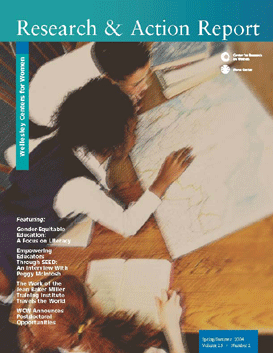Research & Action Report Spring/Summer 2004
High in the Sierra Madre Mountains of Mexico, the leader of a microeconomic project working with indigenous women weavers gave her staff a Spanish-language version of Jean Baker Miller’s book, Toward a New Psychology of Women (1976/1986). “I wish you could have seen their wide eyes and delight as the women read it,” she reported. This is just one example of the countless ways the work of the Jean Baker Miller Training Institute (JBMTI) touches the lives of people around the world.
Four primary missions, which evolved out of meetings of a Stone Center theory group between 1981 and 1995—the year the JBMTI was established—continue to guide the institute today. These missions are:
- to enlarge traditional models of psychological development and therapy, and, in particular, to form a more accurate understanding of the psychology of girls and women from diverse backgrounds and experience.
- to offer training programs to clinicians, educators, administrators, parents, and other members of the community.
- to bring the principles of relational-cultural theory (RCT), JBMTI’s groundbreaking model of psychological development, to bear on organizations and larger social systems.
- to change practices that lead to injustice, oppression, social stratification, and marginalization in all fields of human endeavor.
RCT has been at the forefront of a wave of change in Western psychology, leading a movement away from a psychology of separation toward a psychology of connection. Many professionals working in clinical settings have embraced this model, but it also has implications for social change beyond individual therapy and clinical practice. A psychology of connection, which emphasizes empathic attunement, mutuality, and the primacy of relationships in people’s lives, seriously challenges the competitive hyperindividualism that dominates today’s social, economic, and political institutions. Through the development of RCT, the JBMTI faculty is transforming an ethic of individualistic competition into an ethic of mutuality.
JBMTI programs address micro- and macro-level social problems that ensue from major disconnections and disempowerment, paying particular attention to the impact of racism, sexism, heterosexism, classism, and other forms of discrimination that disempower, disenfranchise, and isolate individuals. JBMTI efforts are focused on finding ways to enhance and enlarge peoples’ capacity to create growth-fostering connections and to help people move beyond forces that lead to the pernicious disconnections associated with social and psychological problems.
The work of the JBMTI travels the world through the publication of over 100 works in progress, 10 project reports, and 16 books, including four core books and more than 20 translations of Jean Baker Miller’s best-selling book, first published in 1976. JBMTI publications are used in many clinical and counseling psychology graduate programs, women’s studies programs, undergraduate psychology and gender courses, and, most recently, in business school programs. This year two new books have been published: How Relationships Heal, which provides clinicians with concrete illustrations of the practice of RCT (Walker and Rosen, 2004), and The Complexity of Connection, a collection of Stone Center working papers that continues the tradition of theory building and questions the social dynamics of isolation (Jordan, Walker, and Hartling, 2004).
The JBMTI is internationally known for its exceptional training programs. “The experience was life changing. I am so excited about bringing this model into my work!” wrote one clinician who attended the Fall Institute. Workshops and conferences with audiences numbering up to 2,000 are conducted throughout the U.S. and abroad and are sponsored by universities, educational groups, professional organizations, nonprofit organizations, and parent and community groups.
Recently, at a meeting in Paris hosted by the Maison des Sciences de l’Homme, Associate Director Linda Hartling presented the work of the JBMTI to a group of international scholars discussing global efforts to enhance human dignity and eliminate all forms of humiliation. At the May 2004 Learning from Women Conference in Boston, co-sponsored by JBMTI and Harvard Medical School, women’s mental health in relationship to community, society, and culture was addressed through discussions of connection, disconnection, violation, and paths to reconnection.Along with publications and training programs, the JBMTI Research Network supports ongoing qualitative and quantitative research projects and has compiled a list of over 500 research articles and theoretical papers incorporating the relational approach. At the heart of all of these JBMTI activities is the belief that RCT leads to new possibilities for enhancing the way people live and work in the world.
Jordan, J. V., Walker. M., and Hartling, L. M. (2004). The Complexity of Connection: Writings from the Stone Center’s Jean Baker Miller Training Institute. New York: Guilford Press.
Miller, J. B. (1976/1986). Toward a New Psychology of Women. Boston: Beacon Press.
Walker, M., and Rosen, W. (2004). How Relationships Heal: Stories from Relational-Cultural Therapy. New York: Guilford Press.


